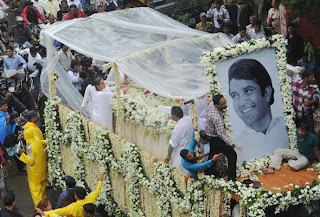He was the embodiment of 21st century version of American dream. His battle with near fatal testicular cancer and later unprecedented
success in the gruelling Tour de France was the stuff legends were made of.
Overcoming cancer and then winning (that too seven times) probably the most
punishing activity in the modern sporting arena was really something.
Participants in Tour have to pedal a distance of 3,497 kilometres covering stretches of
Italy and Switzerland, in addition to France. The
route passes through mountainous stretches of Pyrenees and Alps. However, its history is badly scarred with drug taint and numerous ex-champs were stripped off their titles after testing positive for some banned substance.
All through Armstrong's post-cancer career, allegations of
doping kept following him like a shadow. In 1999 his urine sample showed traces
of corticosteroid in an amount that was not in the positive range. A medical
certificate showed he used an approved cream for saddle sores which contained
the substance. That was probably the closest he came officially to the doping
taint. But there were always a legion of sceptics, who believed that he was not
clean; in fact, he was too smart to get caught.
But what he did on August 24 took everyone, including his
detractors, off guard. He announced that he is not going to contest the doping
charges as he felt the US
anti-doping agency was indulging in "witch hunt". It drew extreme
reactions. While his supporters and cancer organisations felt he should not
have thrown in the towel, his detractors felt vindicated.
Though Armstrong is probably the most tested athlete and has
never failed in any test, barring the 1999 aberration, his reputation has always
been under cloud. It took further beating when fellow US cyclist Floyd Landis,
who himself got disqualified in a drug test, said Armstrong used performance
enhancing drugs and even taught others how not to get caught.
Unfortunately the world of doping is very complex. While knave
dopers like Ben Johnson get caught immediately, there are some who trip after years like Marion Jones. Even Florence Griffith Joyner died amid
innuendos of doping. The reason is that drug cheats are always a step ahead of
anti-doping agencies. They take drugs that are not under the lens of
these agencies and go scot-free. By the time doping agencies device a test for
that particular drug, they move on to new ones. Some even go for blood transfusion to avoid detection.
As a counter measure the doping agencies keep samples for longer periods, so that they can be later tested for newer drugs. And it did succeed in bringing many to book.
As a counter measure the doping agencies keep samples for longer periods, so that they can be later tested for newer drugs. And it did succeed in bringing many to book.
All this is not to cast aspersion on Lance Armstrong, but he
should have fought on if he were clean. By refusing to do so he has provided a handle to sceptics. He had previously won an indomitable battle
against cancer and these allegations are nothing compared to that.
Also Read: Bangalore Beat
Also Read: Bangalore Beat




